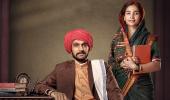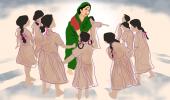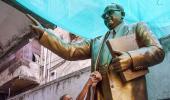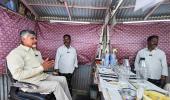'We want to hide it (by saying) we are too busy in our lives, we have other things to attend to, we have families.'
'But they all had families, including Jyotiba Phule or Mahatma Gandhi, or anybody who challenged the system.'

After he was catapulted to stardom in 2020 with Scam 1992, Pratik Gandhi didn't restrict himself to mainstream opportunities.
He is one of those few actors who adeptly straddled the line between mainstream and arthouse.
The actor began 2025 with the goofy comedy Dhoom Dhaam. Up next, is the period drama Phule, in which Pratik portrays social reformer Mahatama Jyotiba Phule.
The Ananth Narayan Mahadevan directorial co-stars Patralekhaa as Jyotiba's wife, Savitribai Phule.
"If we seriously think that movies can change lives, movies can change the thought process of the nation, or one movie can actually move a lot of things socially, politically, personally, if we believe in all that, then Phule should move people," Pratik tells Mayur Sanap/Rediff.
What was your first reaction when the makers approached you to play Mahatma Phule?
I was really excited. It was great to be given this opportunity to portray the first Mahatma of our country.
It's always exciting to create something like this.
You play a Maharashtrian in this film. Being a Gujarati, how did you familiarise yourself with the milieu?
Marathi is very close to Gujarati.
My aunts and uncles are from Mumbai, so we visited Mumbai since childhood.
In fact, I was born in Mumbai.
So I have heard Marathi since a young age.
I completed my graduation from North Maharashtra University, Jalgaon.
That dialect is a little different than the Marathi you hear in Pune.
I always felt that proximity and closeness to the language. It's just that I can't speak it fluently but I understand everything.

Most people would know Jyotiba Phule as a social reformer but he was also a businessman, a trader, a teacher and a playwright. What was your process to assimilate such a diverse personality?
It's a vast subject. His body of work is so huge and diverse that to compile everything and put it into a film of two hours was not an easy task.
There are certain traits that we will show on screen, but may not spell it out.
That's how we have tried to achieve that balance and I hope it has translated well.
You are playing Mahatma Gandhi in Director Hansal Mehta's upcoming series. Gandhi greatly admired Jyotiba Phule's work in social reform and called him the real Mahatma.
As someone who has studied both these personalities, how do you compare them?
Jyotiba happened to India almost a century before Gandhi.
The social condition, social challenges, political scenario and the complexities were much, much different in the times of Jyotiba.
As Gandhiji said, he deserved to be called Mahatma Jyotiba Phule.
But as the century passed and Gandhi's time came, there were more challenges, newer challenges.
I guess they are both Mahatmas in their own right.
The kind of work they have done, you can't imagine anybody even thinking about it.
In today's modern times, we are scared to ask questions against the system. At that time, people were not ready to listen to anything that was beyond certain norms.
When you portray such dynamic characters, do they leave a mark on you?
Yes. I feel privileged that I am an actor and get to be a part of these stories.
So many profound lines came out of their mouth, they did so many things without making any noise.
When you perform these characters, when you say those lines, when you recreate these sequences, they move you.
Some things stay with you the whole life.
Mahatma Gandhi's simplicity touched me. Not only in terms of the appearance and clothes, but in his thoughts and process.
For Jyotiba Phule, there are so many things. He was a practical person.
Like you said, he was not only a reformer, there are so many different aspects to his life.
He used to take labour contracts from the government and he would put the money he earned in reforms by opening vidhva ashrams (community homes for widows), child education and all those things.
That's such a practical approach towards life.

Can you share any particular moment from this film that impacted you?
I will give you spoilers if I talk about it! (Laughs)
When he is given the name Mahatma, he delivers a speech. Some part of that speech is a part of the trailer.
'Humara desh ek bhavuk desh hai. Yahan, dharam aur jaati ke naam par logo ko ladhana bada hi saral hai. Yeh bhavishya mein bhi hoga (Our country runs on sentiments. It is very easy to make people fight in the name of religion and caste. This will happen in the future too).'
Such a profound line.
Not just today or hundred years back, this will stand true in centuries to come.
There's something called Powada (a form of poetry that glorifies) in Maharashtra.
When I was performing that line, a Powada group came and created a song for Jyotiba and Savitribai Phule. When the song reached its crescendo, I got goosebumps.
There's another sequence where Jyotiba is down with paralysis and he thinks his life will end. There are certain things that he wants to discuss with Savitribai Phule. That scene is very close to my heart.
Did you visit his published works as a part of your prep? Like his most notable book, Gulamgiri.
Gulamgiri will be a part of the film.
The book was with us during the shoot.
I read many anecdotes and things from that.
The script itself is good research material because it is such a vast topic that you have to research almost everything and then decide on the flow of the story.

How does the social commentary in this film mirror our current times?
I think socially, somewhere we are losing that selflessness.
Everybody is scared.
We want to hide it (by saying) we are too busy in our lives, we have other things to attend to, we have families.
But they all had families, including Jyotiba or Mahatma Gandhi, or anybody who challenged the system.
It's just that the courage is missing.
And I'm including myself.
We all have some angst. We ask why are things not changing.
But what are we doing?
We live in difficult times.
Jyotiba's philosophy says: 'People die, thoughts don't die'. Do you relate to his words?
Absolutely. This is the philosophy that the world survives on.
All the reformers and thinkers have given us something different in life, which stays with us for centuries.
Like the concept of Ahimsa (non-violence).
Jyotiba had said that if you want to fight the British, or any system, arms and ammunition is not required. What you require is knowledge.
It fits in today's context also.
The recent trend shows that the masses are lapping up angry movies, and these movies are doing well. Where does a film like Phule stand in such a scenario?
If we seriously think movies can change lives, the thought process of a nation or move things socially, politically, personally, then this film should move people.
A film which shows anger or violence in a different way is largely working, as you're saying. If that is true, it shows the sentiment around us, right?
There is a lot of angst in people's minds.
Most of the people are angry and that anger wants to come out.
But Phule will tell them that if you are angry or not happy with certain things, violence is not the only way. There are other powerful ways to tackle this situation.
Phule was really angry, really hurt. He was discriminated on the basis of his caste and that triggered what he did.
If you are really angry about certain things, this is the most sustainable way to set things right and change.
That's how I understand Phule's life, and I hope it translates for people also.

Your frequent collaborator Hansal Mehta recently said that the Hindi film industry needs a disruption in its process. What do you think he is trying to say?
All the industries need innovation consistently and constantly because everything is changing extremely fast.
I am sure camera companies would have never thought that mobiles will replace them, and before they could realise that, they were replaced.
The same thing is happening in stories and films.
As an actor, what I understand is that if you liked certain characters, my job is to present another range to you and not do the same thing.
I believe in the first thought of films: Why are you making this film?
Is it the story so compelling that it is not letting you sleep?
Is it constantly telling you that this needs to come out?
If it comes from that point of passion and if the intentions are right, it will translate well.
But if the starting point is wrong, like if you begin to make a film with the thought that let's make a Rs 100 crore film, then it it is bound to fail.
And things are largely failing.












 © 2025
© 2025